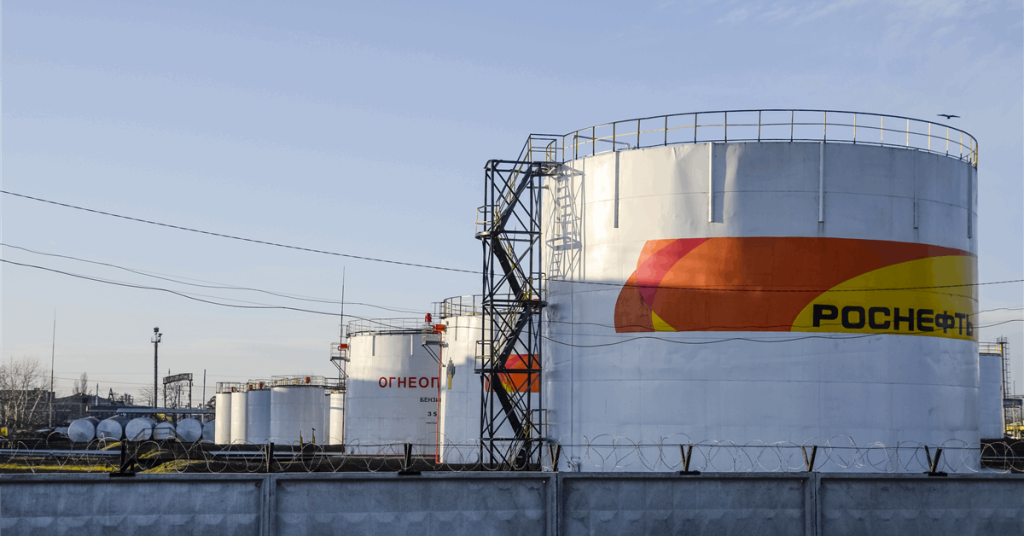PJSC Rosneft Oil Co. has reported a 68.3 percent year-on-year decline to RUB 245 billion ($3.04 billion) in net income for the first half of 2025, citing lower oil prices, impact from Western sanctions and high Russian taxation and central bank rates.
EBITDA fell 36.1 percent to RUB 1.05 trillion, while revenue from sales and equity share from the profits of associates and joint ventures dropped 17.6 percent to RUB 4.26 trillion, state-owned Rosneft said on its website.
This month Rosneft completed the payment of dividends for 2024, which totaled RUB 542 billion or RUB 51.15 per share. That was down from 2023’s RUB 59.78 per share.
Production in January-June 2025 averaged 4.99 million barrels of oil equivalent a day (MMboed), down from 5.36 MMboed in 1H 2024. The 1H 2025 total included 3.67 million barrels per day (MMbpd) of oil and 1.32 MMboed of gas.
“Some companies demonstrated growth in hydrocarbon production in the reporting period, but it was ensured by increased production from international projects, including Venezuela, Iraq, Egypt and others”, Rosneft said of its 1H 2025 output.
“Rosneft, operating under service contracts, does not book reserves and account for commercial oil production”.
Refined volumes totaled 38.7 million tons for 1H 2025. Rosneft’s report for 1H 2024 said it had produced 40.9 million tons from Russian refining.
“Decrease in the refining volume is attributable to the need for maintenance and repair works as well as to the optimization of refinery utilization in view of the current pricing environment, logistics constraints and demand”, Rosneft said.
Chair and chief executive Igor Sechin said, “The first half of this year was characterized by a decline in oil prices primarily due to oil oversupply. The main reason is the active production build-up by OPEC countries, including Saudi Arabia, UAE, Iraq, Kuwait, while production growth is also observed in Brazil and other countries”.
“According to our estimates and expectations of leading energy agencies, the oil market surplus will amount to 2.6 MMbpd in 4Q 2025 and 2.2 MMbpd in 2026”, Sechin added.
“In addition, there was a widening of discounts on Russian crude oil due to tighter EU and US sanction restrictions and a significant ruble strengthening, which impacted the financial results of exporting companies. It should be noted that non-market formation of the national currency rate ultimately leads to non-market non-transparent pricing of oil and petroleum products both domestically and internationally.
“Moreover, I would like to note the outstripping growth in natural monopolies tariffs, which is putting additional pressure on the oil industry in the challenging market conditions. There has been indexation of Transneft transportation tariffs for crude oil by 9.9 percent and oil products by 13.8 percent and RZhD freight rail transport tariffs by 13.8 percent since the beginning of the year, as well as indexation of Gazprom’s regulated wholesale gas prices by 10.2 percent and tariffs for transmission services by 11.6 percent since July.
“Excessive indexation of tariffs regulated by the Russian government accelerates cost-push inflation, encourages higher prices and is one of the reasons for the slower reduction of the key interest rate.
“Despite the decisions taken by the Bank of Russia in June-July, the pace of interest rate cut is clearly insufficient.
“One of the consequences of a long period of the elevated key rate is the excessive ruble strengthening, which inflicts losses on both the Russian budget and the exporting companies.
“In addition, the high key rate leads to incremental interest expenses, which harm the financial stability of corporate borrowers, reduce profits and undermine their investment potential”.
To contact the author, email jov.onsat@rigzone.com
element
var scriptTag = document.createElement(‘script’);
scriptTag.src = url;
scriptTag.async = true;
scriptTag.onload = implementationCode;
scriptTag.onreadystatechange = implementationCode;
location.appendChild(scriptTag);
};
var div = document.getElementById(‘rigzonelogo’);
div.innerHTML += ” +
‘‘ +
”;
var initJobSearch = function () {
//console.log(“call back”);
}
var addMetaPixel = function () {
if (-1 > -1 || -1 > -1) {
/*Meta Pixel Code*/
!function(f,b,e,v,n,t,s)
{if(f.fbq)return;n=f.fbq=function(){n.callMethod?
n.callMethod.apply(n,arguments):n.queue.push(arguments)};
if(!f._fbq)f._fbq=n;n.push=n;n.loaded=!0;n.version=’2.0′;
n.queue=[];t=b.createElement(e);t.async=!0;
t.src=v;s=b.getElementsByTagName(e)[0];
s.parentNode.insertBefore(t,s)}(window, document,’script’,
‘https://connect.facebook.net/en_US/fbevents.js’);
fbq(‘init’, ‘1517407191885185’);
fbq(‘track’, ‘PageView’);
/*End Meta Pixel Code*/
} else if (0 > -1 && 60 > -1)
{
/*Meta Pixel Code*/
!function(f,b,e,v,n,t,s)
{if(f.fbq)return;n=f.fbq=function(){n.callMethod?
n.callMethod.apply(n,arguments):n.queue.push(arguments)};
if(!f._fbq)f._fbq=n;n.push=n;n.loaded=!0;n.version=’2.0′;
n.queue=[];t=b.createElement(e);t.async=!0;
t.src=v;s=b.getElementsByTagName(e)[0];
s.parentNode.insertBefore(t,s)}(window, document,’script’,
‘https://connect.facebook.net/en_US/fbevents.js’);
fbq(‘init’, ‘1517407191885185’);
fbq(‘track’, ‘PageView’);
/*End Meta Pixel Code*/
}
}
// function gtmFunctionForLayout()
// {
//loadJS(“https://www.googletagmanager.com/gtag/js?id=G-K6ZDLWV6VX”, initJobSearch, document.body);
//}
// window.onload = (e => {
// setTimeout(
// function () {
// document.addEventListener(“DOMContentLoaded”, function () {
// // Select all anchor elements with class ‘ui-tabs-anchor’
// const anchors = document.querySelectorAll(‘a .ui-tabs-anchor’);
// // Loop through each anchor and remove the role attribute if it is set to “presentation”
// anchors.forEach(anchor => {
// if (anchor.getAttribute(‘role’) === ‘presentation’) {
// anchor.removeAttribute(‘role’);
// }
// });
// });
// }
// , 200);
//});

